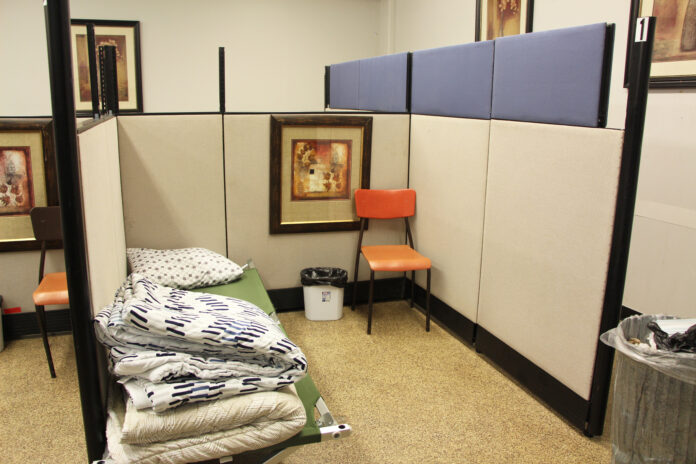Prince Albert’s new cold-weather shelter has been open for two weeks now and it looks different from past years with changes made to allow for physical distancing.
There are 20 beds in the shelter, which is 10 more compared to what previous cold-weather shelters had.
The shelter opened on Nov. 4 on the exhibition grounds. The YWCA operates the shelter with partner agencies assisting with other programs.
PAGC Urban Services provides hot meals to the clients, something previous cold-weather shelters didn’t have. In past years, clients would be provided a snack, according to supervisor Tonya Kleinert.
Each client has their own space that is divided with partitions. There’s a cot, a chair, a garbage can and a picture frame hung up in each space.
“They seem to like them, a little more privacy, they each have a hotel photo in them and it’s just a little more homey, a little more welcoming,’ Kleinert said.
In previous years, clients would have shower curtains between them and beds would be much closer together, YWCA Homeward Bound manager Rob Dunlop said.
“The privacy that they have is not something you get anywhere else really. They’re quite pleased and especially compared to the old one, just to have this privacy. They call them their little homes,” Dunlop said.
The shelter is named Stepping Stones which Dunlop said has significant meaning. The shelter is a ‘stepping stone’ into permanent housing for people experiencing homelessness. Dunlop said this is because the shelter is connected to housing programs through the YWCA. Staff can make referrals for clients to be interviewed for permanent housing.
“This is a gateway into permanent housing for the people that come here so it’s part of the overall continuum of care that we’re trying to get in place in Prince Albert to help people get off the streets,” Dunlop said.
Dunlop and Kleinert said two clients have already moved into permanent housing, and two more are in the process.
The shelter is also open for 18 hours, with clients arriving at 6 p.m. and leaving 10 a.m. The space is cleaned and sanitized after clients leave. Staff and clients have to wear masks at all times except when they are eating.
Clients go through a screening process for COVID-19 symptoms when they come in, including having their temperature taken. If a client does have symptoms, EMS picks them up.
The shelter has been full almost every night, Kleinert said.
River Bank Development Corporation helped get the shelter up and running. River Bank manages funding from the federal government’s Reaching Home program. Typically, the city gets around $600,000 to put towards homelessness strategies. The program gave out around $1 million in additional funding to cities this year to help deal with the added pressure of the pandemic.
Brian Howell, manager of River Bank Development Corporation said the additional funding has been put towards several programs such as hotel rooms for those needing to self-isolate and the cold-weather shelter.
The previous cold-weather shelter was located in the basement of Our House.
“It was a little crowded so it wasn’t really a desirable place to have employees and clients so we recognized last summer that we would need to have a bigger, better shelter at least for this winter because of COVID,” Howell said.
River Bank Development Corporation entered into an agreement with the YWCA, the City of Prince Albert, and the exhibitions ground to establish the shelter.
Renovations had to completed for the shelter to open up, including installing showers, laundry machines, smoke detectors and fire doors. The renovations took two to three weeks to complete.
Howell said he notices there are more people experiencing homelessness this year — whether that has to do with the pandemic or not. He said he’s very concerned about the impact the virus has on the community, especially in the cold weather.
For people on the street, their resistance becomes weakened because they are using so much energy to stay warm, Howell says. Being able to provide food at the new shelter is a big help he added.
Howell is also happy to see that clients are screened at the shelter for COVID-19 symptoms when they come in as it’s good way for them to access the quarantine hotel program if needed.
There are other programs that have been implemented to help the community during the pandemic along with others in the works, but Howell said the first priority was opening up the cold-weather shelter.
“We started out with a focus on the really basic need so that we’d really be spending the money on keeping people alive you know when you sleep in the shelter and not behind the building, Howell said.
“You got a better chance of being awake in the morning.”


